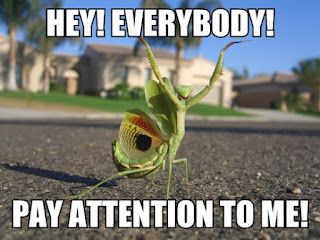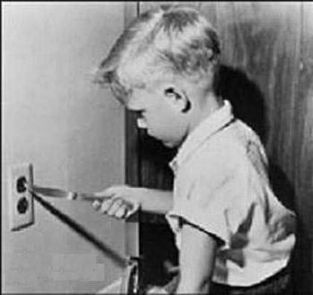Let's say something so stupid we have to call it science: obnoxious, loud children 'learn better'
 |
| My learning style involves everyone else not learning. |
Comedy Gold dropped into my email box this morning; a timebomb of stupid that I normally associate with people 'standing on street corners, selling coloured pencils from a tin cup,' to quote the Hitch. Only this time it was a paper written by m'learned educational scientists at Durham University, and blazed on the BBC news website here. The claim was that children who shout out in classes do better than their kinder, lovelier peers.
If Charles Darwin read this report he'd be chewing his long beard like Gandalf and wondering what all the fuss was about. 'Competitive, unpleasant organisms unfettered by social mores or self-restraint get more of what they want' isn't exactly news. Nor is 'teachers forced by obnoxious organic alarm clocks to focus attention on hitting the snooze button until Hell freezes over.'
'The lead author of the research, Peter Tymms, head of Durham University's school of education, said that among children with ADHD symptoms, those who got excited and shouted out seemed to be more "cognitively engaged and as a result learn more".
"Perhaps those children also benefit from receiving additional feedback and attention from their teacher," suggested Prof Tymms.'
 |
| TEACH ME! TEACH ME! |
Let's not do that.
'Ms Merrell, CEM's director of research and development, said she wanted to carry out further studies to see how pupils could be encouraged to shout out as part of the lesson.'
OH BOY OH BOY, I bet the teachers will be QUEUEING ROUND THE BLOCK for Ms Merrell to start doing her experiments in their class. Perhaps after that we can test the effect of letting kids fling faeces at the teacher like Barbary Apes. Form a line, comrades.
"We need to look more closely at this behaviour and how the interaction can be managed in the classroom."
 |
| The data suggests that this is optimal. |
Other aspects of this paper:
1. The title: 'ADHD and academic attainment: Is there an advantage in impulsivity?' Are they kidding me on? Are they really asking that question? Normally Educational Social Science needs to be pretty brave to show its face round my manor, but this takes the whole packet of biscuits. Are they having me on? Ask anyone with an ounce of language and experience and they would tell you the answer to the question: yes, of course there is, sometimes. But it still makes you a dick. I look forward to the follow up: 'stealing things- does it mean you get more stuff?'
For F*CK'S sake.
2. 'However, it is also recognised that these behavioural problems can lead to children being excluded from pre-school and school from an early age, and that early interventions are promising.' Or to put it another way, kids who shout out and misbehave get in trouble a lot, and if you work hard with them to control themselves at an early age, they can improve. Which we already know. How do we know? We work with kids. Isn't that grand?
 |
| School Uniform? More research is needed. |
'Could an unmeasured variable, such as the intelligence, confidence or knowledge of some young children be acting as the key causal factor? This is a possibility; only intervention studies could firmly establish a direct causal link.'
Say it isn't so! You think...you think it might be something else? You think maybe it wasn't just the shouting out that gave them an educational advantage? I love the cautious, wide-eyed uncertainty allowed to creep in at the end, as if they were scared to even ask the question: is it possible that human behaviour is so complex, that the causal density for potential explanations is almost infinite, and the possibility of exacting a clear predictive mechanism is next-to impossible? Let me answer that one for you: yes, it is possible.
It's possible that you wrote this paper before you wrote it. It's possible that you found exactly what you were looking for. It's possible that the first ten cars I see tomorrow will be red: does that mean that Friday generates a glut of scarlet Hyundais? If, every time I wake up on a Sunday morning I have a sore head, a wet mattress and a pocket full of sticky pennies, can I infer that Sunday mornings cause incontinence, cephalalgia and amnesia, or should I look to the pile of empty Laphroaig bottles surrounding my bed?
4. Most importantly, this paper actually only makes the claim that pushiness is a competitive learning advantage in the group that already displays inattentiveness; in other words, being quiet and well behaved still outweighs all the other factors in terms of educational achievement correlation, as you might expect. It's just that the shouty kids who are inattentive do better than the quiet kids who are inattentive. Now that's not so much of a claim,but in my opinion, the paper frames these themes in such as way as to present them in a more newsworthy and provocative, bone-headed light. The news article certainly does.
 |
| T-Rex: surprisingly good Value-Added. |
But more than that, I despair of the way that papers like this are presented in the national media. Normally sober and I'm sure, reliable journalists put things like this under the magnifying glass, cranking up the claims and turning a fairly standard investigation into data, into something beyond even the claims of the writers. The paper itself is no worse than many others, and was, I'm sure the result of many hours of dedicated enquiry and analyses. It isn't the author's fault that the factual conclusions of the research are so unremarkable, although it is their fault that the suggested implications are so knuckle-headed. But the BBC online news portal seems to be increasingly hyperbolic, as if no Thursday could be complete without a claim so absurd that the Krankies would have blushed to imagine it.
And of course, the real heart ache is that people will pick up on research like this, and attempt to shoe horn it somehow into the classroom, advising impressionable teachers to let their kids shout out because of some imagined benefit it brings. What kind of people? Normally people who have never taught in a classroom, never will, and yet have the kind of stones to tell people like you and me how children best learn. Get back in your pit, weasels. We have a job to do.
Teacher Voice.
Thanks to @Bio_Joe for passing on the paper to me, and highlighting the alternative hypothesese.
Read the paper yourself here. It's a barrel of laughs. At least it's short.


Very good indeed. I do enjoy reading your posts.
ReplyDelete